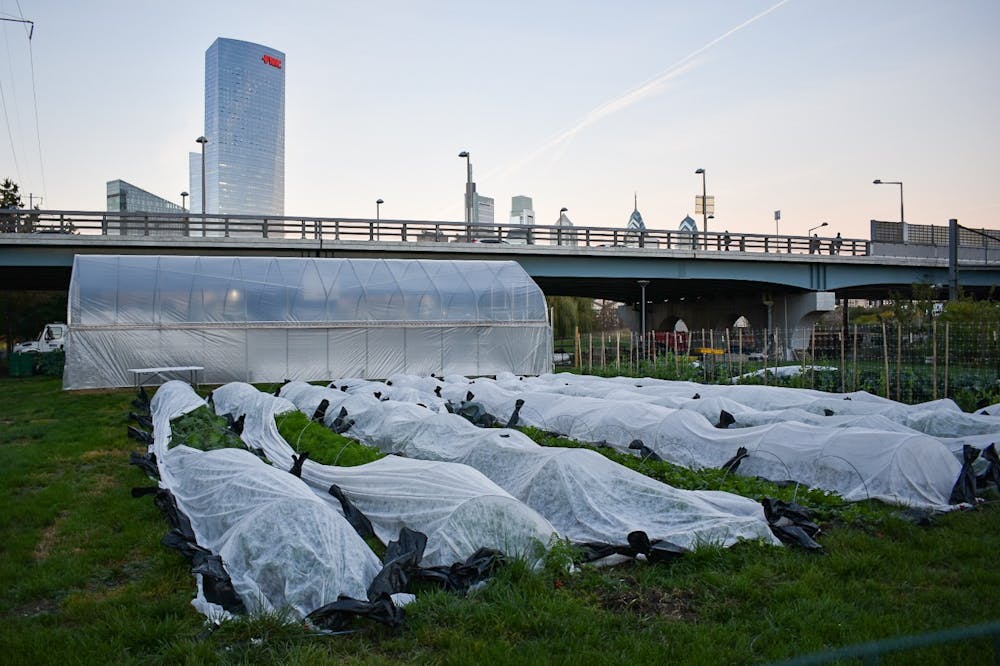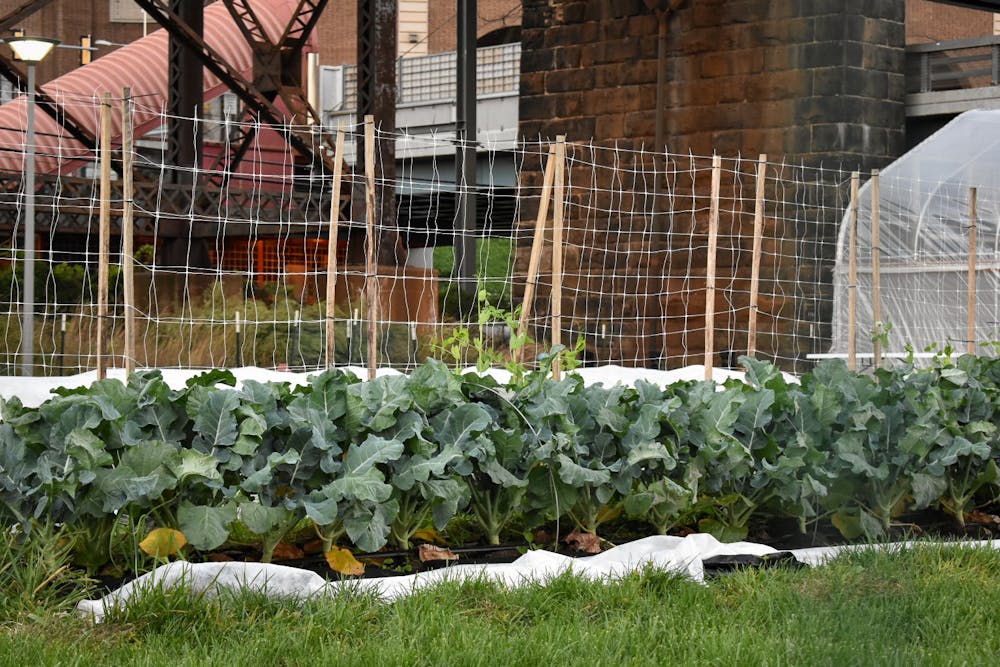
Penn Park Farm aims to provide produce for food-insecure Penn students, staff, and the Philadelphia community.
Credit: Samantha TurnerThe Penn Food and Wellness Collaborative has started a farm in Penn Park to combat food insecurity at Penn and in Philadelphia — an issue exacerbated by the ongoing COVID-19 pandemic — and increase healthy habits on campus.
The Penn Park Farm and its greenhouse, located at the southernmost tip of Penn Park, welcomed its first harvest of more than 300 pounds of cold weather produce such as kale, spinach, lettuce, and cabbage in September. After the closure of on-campus housing forced the collaborative to scratch its initial plans to dedicate this semester's harvest to first-generation, low-income students at Penn, PFWC coordinator Lila Bhide said the team decided to donate the produce to the Philadelphia Orchard Project.
The Philadelphia Orchard Project works with community-based groups and volunteers to plant orchards and distribute the produce to food distribution programs in West Philadelphia.
PFWC was selected as one of three winners in the “Your Big Idea” challenge in April 2019. Jennifer Pinto-Martin, nursing professor and executive director of the Center for Public Health Initiatives, and Chief Wellness Officer Benoit Dubé launched the initiative in February 2019 to help fund wellness initiatives for the Penn community. The inaugural challenge, which garnered 380 submissions from students, staff, and faculty, featured two other winning projects including “weekly themed walks” and nature prescriptions to encourage health providers to prescribe time in nature for students.
PFWC also plans to partner with Penn Medicine for the spring's harvest and provide produce to Penn Med patients and staff, many of whom are dealing with food insecurity as a result of the pandemic, Pinto-Martin said. The Institute for Policy Research at Northwestern University reported in June that food insecurity has doubled overall and tripled among households with children since the on-start of the pandemic in March.
“Food insecurity is so real and so pervasive, especially [during the] COVID [pandemic], because families have one or more of the breadwinners who have lost their job,” Pinto-Martin said. “It's such a wonderful way for Penn to give back and for students to get involved in something that is really meaningful and important.”

While PFWC had planned to start planting crops on March 15 for a harvest in the summer, the COVID-19 pandemic delayed its timeline by a couple of months, Pinto-Martin said. By August, PFWC received permission to allow workers to start planting crops while wearing masks and adhering to social distancing guidelines, College sophomore Megan Zhong and PFWC student intern said.
Bhide and Facilties and Real Estate Services landscape planner Chloe Cerwinka said they had hoped to expand the Penn Park Orchard established at the southernmost tip of Penn Park in 2014. Both Pinto-Martin and Cerwinka have overseen the process of digging the plant beds and building the greenhouse on the neighboring turf of the Penn Park Orchard.
She attributed the farm’s success to the collaborative effort between FRES, PFWC, Provost Wendell Pritchett, and other campus initiatives like the Netter Center for Community Partnerships' Agatston Urban Nutrition Initiative.
Zhong began interning with PFWC this summer and has helped prepare the farm for harvest and spread awareness of the project to the Penn community. Zhong, who is studying public health and nutrition science, said working with PFWC has made her more aware of the challenges in running an urban farm like choosing which crops would be able to thrive in colder weather.
"I think this program is a good intersection between addressing the health and wellbeing of the West Philadelphia community, including the FGLI students at Penn, and also adjusting nutrition and having access to good quality produce," Zhong said.
Once in-person classes resume, Bhide said she hopes the farm will also be a place where professors can teach students about food systems and conduct hands-on labs. PFWC also hopes the farm will help students destress and prioritize physical and mental wellness when they return to campus, she added.
“It's such a high stress time to be a student, especially at such a rigorous university like Penn,” Bhide said. “I think there's so much therapeutic value in being outdoors and working with the land.”
Cerwinka said it has been “unbelievable” to watch the farm evolve from an idea to a reality.
“We had this dream for so many years, but we just didn't really know if it would ever happen, because it wasn't something we could have done on our own,” she said. “It really took a strong partnership to make it happen.”
The Daily Pennsylvanian is an independent, student-run newspaper. Please consider making a donation to support the coverage that shapes the University. Your generosity ensures a future of strong journalism at Penn.
Donate




